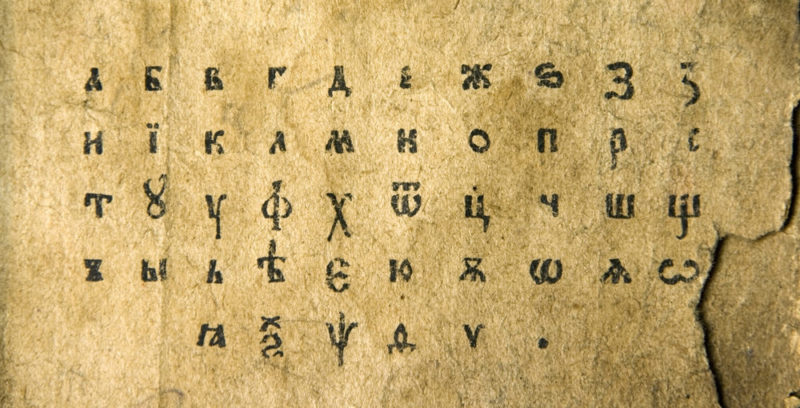We explain what east and west are and the types of writing they present. Also, what are their differences and characteristics.
What is the East and the West?
The conceptions of East and West refer to two geographical regions but differentiated above all in cultural aspects .
The identification of the West as a unit began with war ( The Crusades ) and commercial contact with countries culturally very different from Europe that we currently know as the East : Arab, Muslim and Asian cultures in general. By extension, African cultures were included in the East , even though they were not found in Eastern Europe.
On the other hand, the American continent , which was entirely colonized by European cultures, is considered Western, but not precisely because of its location to the West of Europe, but because of its cultural identification with it.
Origin of the West

Western cultures have their origin in the first civilizations of the Mediterranean . European societies had intense contact during Antiquity and the Middle Ages , forming differentiated cultures but with points in common. In the Modern Age those common points were transferred to their colonies.
Origin of the East

Eastern cultures have diverse origins. In the Far East, the oldest cultures are the Chinese and the Mongols , in which reigns and empires can be traced back approximately 6,000 years. The Japanese and Korean cultures were deeply conditioned by Chinese influence, due to their geographical proximity and their commercial and military exchange.
The Slavic nations (Russians, Ukrainians, Belarusians) were first united into a unified state at the end of the 9th century, but their common origins can be seen in their very similar scripts and languages.
The Middle East , on the other hand, has very similar origins to the West , in the early civilizations that were organized around the Mediterranean.
African civilizations have the oldest origins , since the human species originated in Africa , later conquering other continents. However, Africa is a very extensive territory, where each civilization found a particular development, some establishing great kingdoms, such as Egypt and Morocco, while others formed scattered villages without a central government , being more vulnerable to colonization and looting.
Western script
The Latin alphabet is probably a variant of the ancient Greek alphabet that was used in a Greek colony on the Italian peninsula. The Greeks had adapted it from the Phoenician alphabet. The Greek alphabet was modified by the Etruscans, forming 26 letters. The Romans formed an alphabet of 21 letters, just like ours but without the letter g, j, u or W. However, those sounds were represented by other letters.
Eastern scripts

Among the oriental scripts there is a great variety: from Chinese, Japanese and Korean ideographic scripts , to the great variety of Arabic calligraphies. Also included is the 33-letter Cyrillic (Russian) alphabet, which has been recorded since the 10th century AD, that is, it is much later than the other alphabets.
This great variety is due to the fact that the term "oriental" comes from the West , which encompasses in a single group cultures that are actually very diverse from each other.
Western languages

- Latinos. Spanish, French, Italian and Portuguese derive from Latin.
- Anglo-Saxons. English and German derive from Old English, also called Anglo-Saxon.
Oriental languages
The Eastern languages are divided into twelve large groups:
- Altaic:
- Turkic
- Mongolian
- Tungus
- austronesian
- Austroasiatic
- Northern Caucasian
- Najdagestani languages
- Abkhaz–Adygh languages
- southern caucasian
- Dravidians
- Indo-Europeans
- Indo-Iranian
- Germanic
- Slavic
- Sino – Tibetan
- Sinitic
- Tibetan – Burmese
- Semitic
- Tai–kadai
- Hmong–Mien
- Uralic
Western religions
Although at the beginning most of the cultures had polytheistic religions , currently Western religions are monotheistic (worship of a single god) who transmits his desires and teachings through prophets.There is the concept of sin as an offense against God , since certain immovable moral principles come from the deity. It is believed, indirectly, in a system of rewards and punishments that can be observed mainly in eternal life. There is a division between the soul and the body .
Eastern religions
 There are both monotheistic and polytheistic religions, but the latter also have a main god. The idea of sin or evil is not so common , but of mistakes and the possibility of learning.
There are both monotheistic and polytheistic religions, but the latter also have a main god. The idea of sin or evil is not so common , but of mistakes and the possibility of learning.The will of the gods is mysterious , and understanding their teachings requires mental and, in some cases, physical effort, since religion is usually associated with beneficial practices for the body. There is a communion between the soul and the body.
Cold War
 After World War II , the world was divided politically between the First World, associated with capitalism , and the Second World, associated with communism . The Third World, which currently refers to the lack of economic development, was simply the set of countries not aligned with either perspective.
After World War II , the world was divided politically between the First World, associated with capitalism , and the Second World, associated with communism . The Third World, which currently refers to the lack of economic development, was simply the set of countries not aligned with either perspective.In this sense, the opposition between the West and the East was reformulated as an opposition between capitalism and communism , since in the East were the main communist forces: the Soviet Union (Russia) and China .
Preservation of traditions
The East is clearly distinguished from the West by the preservation of ancestral customs, some of which have existed for thousands of years . This difference is due, on the one hand, to the fact that the West experienced, from the fifteenth century, Modernity , a time in which the new was prioritized and an attempt was made to deliberately break with previous traditions.On the other hand, some currents of Western thought support the idea of progress , while Eastern thought supports the idea of cycle and repetition.
The above content published at Collaborative Research Group is for informational and educational purposes only and has been developed by referring reliable sources and recommendations from experts. We do not have any contact with official entities nor do we intend to replace the information that they emit.
MA student of the TransAtlantic Masters program at UNC-Chapel Hill. Political Science with a focus on European Studies. Expressed ideas are open to revision. He not only covers Technical articles but also has skills in the fields of SEO, graphics, web development and coding. .
Leave a reply
Your email address will not be published. Required fields are marked *Recent post

Sport: What Is It, Types, Risks, Features, Characteristics and Examples

Dogs: Emergence, Features, Characteristics, Feeding and Breeds

Story: Definition, Elements, Structure, Features and Characteristics

